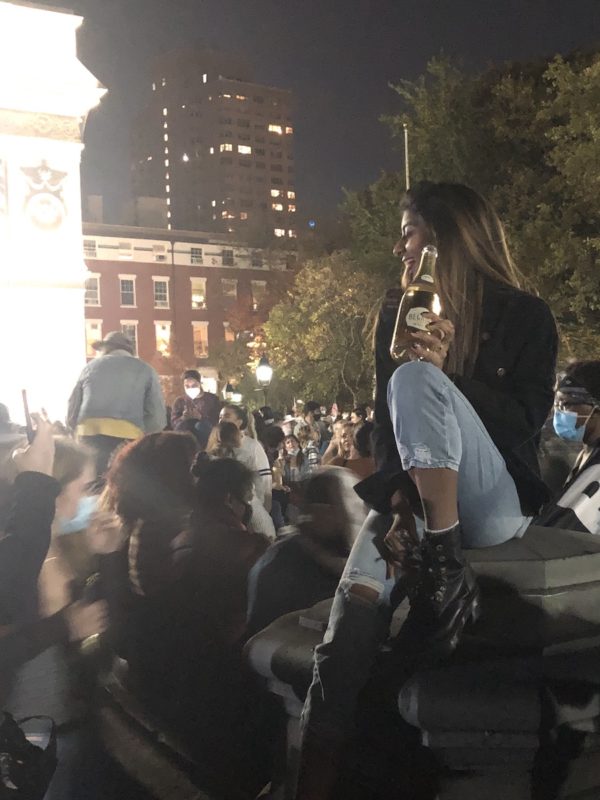
Downtown Vibe
Agita in Greenwich Village
The pandemic brought heroin and all-night ragers to Washington Square Park. What’s next?
For the last 35 years (or maybe 40, he’s a little hazy on the details), David Solomon has been sitting at a stone table at the southwest corner of Washington Square Park, hustling chess, giving lessons, and dispensing advice to anyone who’ll sit and play with him ($20 a game, $40 for an hour’s lesson). He’s seen the park go through many cycles, and always recover, but the last few years have been particularly bad, he says.
“It started to change about four years ago,” says Solomon. That’s when ‘Skid Row’ appeared, along the the diagonal alley that points southeast into the park from the corner of Waverly Place and MacDougal Street. “It hurts me to watch it,” he adds, before pushing this distracted reporter into checkmate and taking my $20 bill.
Take a walk down that 200-foot stretch of junkies jonesing, begging, or sleeping off a high, and you see a live tableau from a Breughel painting. Mostly men, mostly older, mostly Black, and only occasionally focused on the scene in front of them, they are crumbling wrecks of humanity reeking of piss and sweat and rotting teeth as they sit on the benches after a night asleep in the expansive vestibules of the the nearby West 4th Street subway station.
“Weed? Weed? Weed, Smack?” asks an unfocused man in dirty clothes and a sideways cap.
“Riff-raff,” mutters Sandra Bailey, a 60-something Black woman pushing a shopping cart filled with $10 plastic bottles of frozen Jamaican rum punch and fluffy fish fritters that she’s hawking with little success. Bailey’s been visiting the park most of her life. Now, she says, “It’s a homeless shelter.”
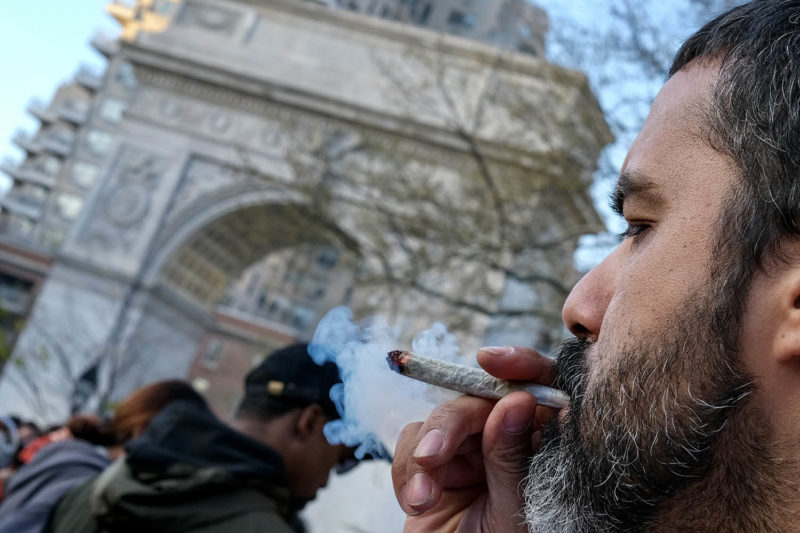
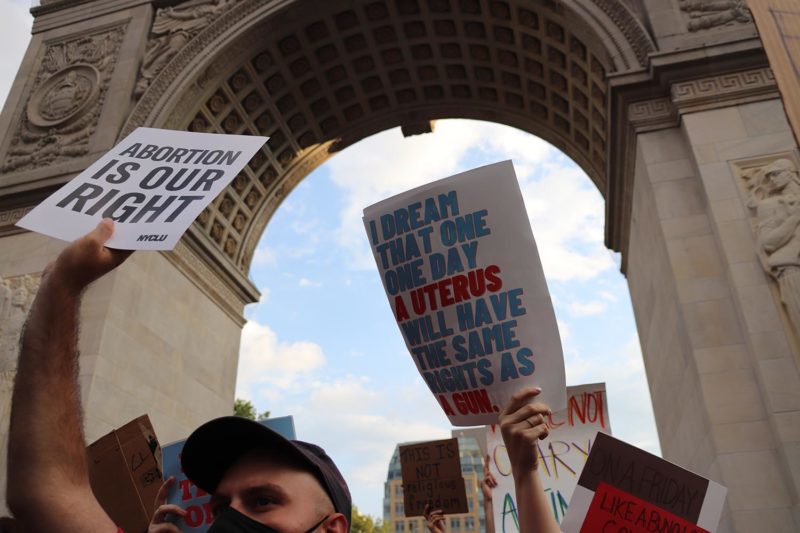
New York’s parks have all gone through cycles of popularity, neglect, and resurrection.
Central Park was a killing zone in the 1970s and ‘80s and Tompkins Square Park has long been an ad-hoc homeless shelter that goes through periodic cleanups as the East Village gentrifies, then slides back again into anarchy. Even Gramercy Park, the fenced and locked private garden in the East 20s, was beset by crime and violence in the mid-1990s, until neighborhood residents worked with police and city agencies to clean up a nearby single-room occupancy hotel, bringing the crime wave to an end.
But Washington Square Park, the public square of New York City, the most energetic and diverse city on the globe, is going through its own particular agony these days.
While Times Square is pitched to tourists as the beating heart of New York City, locals know this 9.75-acre expanse in the heart of Greenwich Village is the City’s true crossroads. It’s where uptown and downtown converge and storied Fifth Avenue begins, from the base of a triumphal arch erected in the early 1890s based on designs by Stanford White, New York City’s first starchitect.
The tree-lined space has functioned as lower Manhattan’s town square since the 1960s, a kind of Zocalo for everything from political stump speeches to protests to festivals. This past June alone, the International Society For Krishna Consciousness held its annual Festival here, complete with free vegetarian food and a large amount of dancing around a spacious striped tent; reproductive-rights advocates gathered in front of the arch after the Supreme Court struck down Roe v. Wade; and imaginatively—and often scantily—clad rainbow-accented revelers filled the park on Pride Sunday.
Always, there are kids in the playground, buskers seeking an audience, chess players swapping pawns, and evangelists seeking salvation across the park’s broad paths and under its trees.
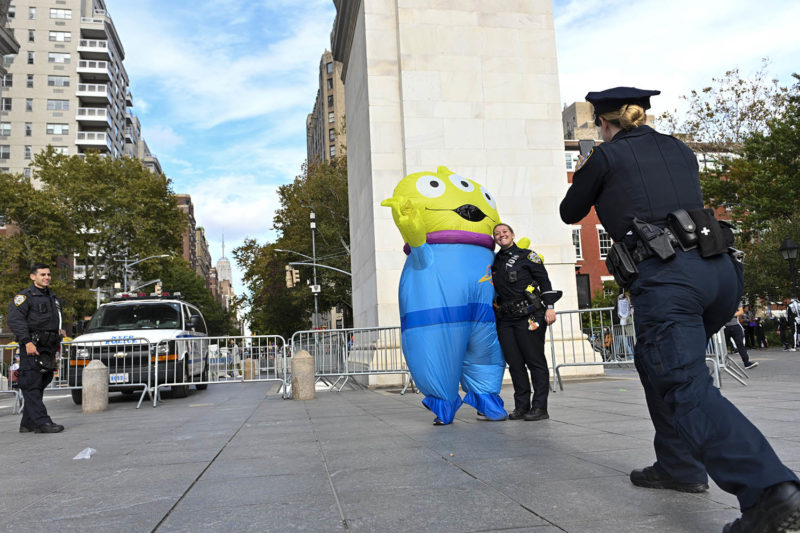

Neighborhood residents have never much liked the people who were drawn to the park. In 1961, the Parks Commissioner, Newbold Morris, banned folk singers. After a group of acoustic guitar-strumming beatniks held a concert in protest, riot police waded in, batons swinging, and arrested 10 people. (The story is recounted in Dan Drasin’s 1961 film, Sunday).
Later, as a cub reporter at the weekly Villager newspaper in 1980, I reported on the City’s failed efforts to take back the park from skateboarders, graffiti artists, drug dealers, and local hoodlums. All of those efforts failed, spectacularly. In one rare moment of sanity, the Parks Department decided to play the same hand as the graffiti artists, and simply paint over their scrawls at the base of the arch.
Then, in the summer of 2021, visitors overwhelmed the space with raves and parties, and locals prevailed upon the City to enforce a 10pm curfew. Late one Saturday night last June, when park partygoers again paid no heed to closing time, police in riot gear swarmed the area round the arch as revelers threw bottles at them. By night’s end, police had arrested 23 carousers; eight officers were reported injured.
“It’s really night and day, now, “says Loen Kelly, a former television producer and onetime area resident who still regularly drops by the chess tables. She blames the park’s changing fortunes on the sheer number of visitors it now attracts. Before the pandemic, Kelly recalls the park moved at a slower pace, and even the junkies took time to say hello. “They were friendly—I mean, I wouldn’t bring one home to mama,” she says.
New York’s newly elected Mayor Eric Adams spoke out against heavy-handed policing in the park while running for the office he now holds. “We can’t have open disorder in our parks,” he told the NY Post in 2021. “That is not acceptable.” But, Adams added, “We don’t have to go in with the SWAT team. We don’t have to go in with helmets and gear.”
The half-dozen cops who patrol the park these days seem to do little. Michael Alcazar, a retired police officer and an adjunct professor of Police Science at John Jay College in Manhattan, blames Adams—himself a 20-year veteran of the NYPD—and his predecessor, the much-maligned Bill de Blasio, for abandoning the Broken Windows policing policy credited with driving down crime in the 1990s. And with no clear direction from the mayor or their top brass, police have little incentive to aggressively patrol, he says.
“The police are discouraged and disgruntled,” says Alcazar. “They just don’t want to do anything anymore for fear of a reprimand or a dismissal.” Police avoid the northwest corner drug den, preferring to stare at their cellphones closer to the arch, where a cleaner class of park goer congregates.
But even if the NYPD were to round up the drug addicts, it’s unclear where they’d go: The City has little permanent supportive housing that would help people like the men—and the occasional woman—on the benches.
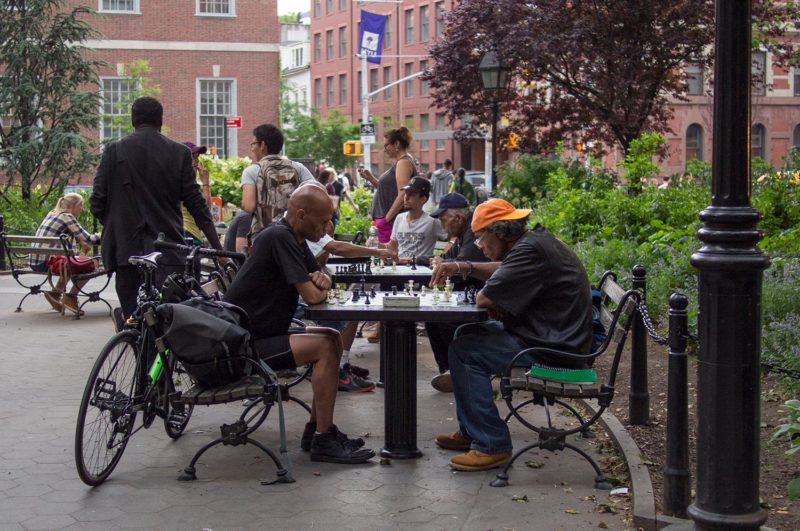
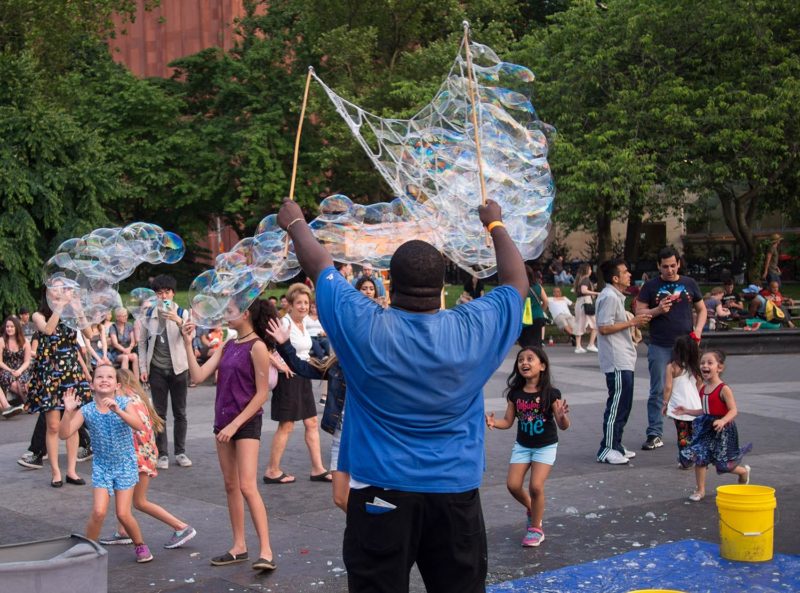
And the junkies are here, in part, because the park has improved over the years. A five-year-long redesign, completed in 2019, added public toilets and created areas that it was hoped would separate the park’s disparate groups of users. Police stopped ticketing musicians and the Parks Department also allowed vendors to sell crafts and music from folding tables around the fountain. Both moves brought an even more diverse group of visitors to the park; they also turned it into a kind of permanent street fair.
Well-heeled locals in the townhouses and luxurious apartment buildings along the park, and up Fifth Avenue—a strip known as the Gold Coast—are irate. At community meetings, they beseech police to beef up park presence and crack down on miscreants, all in an apparently vain hope of restoring the park to some mythical idyll.
While no one has yet asked that the park be gated and residents given a key, like the privately-owned Gramercy Park a few blocks east and north, “there definitely is this feeling that there are some people on Fifth Avenue who want the park to be their garden,” says Cathryn Swan, an erstwhile neighborhood resident who now lives in Brooklyn and blogs about the park.
“The park should be for everyone,” says Swan. “If that means in one corner you may see some people going through hard times and you may not agree with them, it shouldn’t just be a pristine palace for wealthy, upscale people. You have to accommodate different kinds of lifestyles.”
Like anywhere else in New York, people with different kinds of lifestyles—tourists and locals, hustlers and buskers, addicts and school children—bump more than just elbows here. “Any issue is reflected in Washington Square Park,” says Swan. “What goes on there is a microcosm of the City.”
And as one poster wrote on the neighborhood networking platform Nextdoor in response to a stream of complaints about the park’s post-pandemic sex, drugs, and rock and roll: “We are talking about Washington Square Park, right? Can anyone remember a time in the past 30-plus years when this was not the case? I am not sure what the expectation is for the police? Are they expected to roll in with the SWAT team and round up a bunch of penny ante dope dealers and some junkies? To what end? Washington Square Park, Union Square, Tompkins, are all way less frightening than they were in 1990.”
“Remember,” another commenter wrote, recounting a conversation with a high-school friend about the 1980s, “when we would go down to Washington Square Park to buy pot and you had a crush on the heroin-addicted chain-escape artist?”
On a bench in the children’s playground near the bottom of Fifth Avenue, Melissa, an oncology nurse and a 15-year Washington Square regular, was unconcerned by the addicts, the hustlers, the noise, and even the weed-sellers, as she sat watching her children, aged five and seven, play in a sprinkler.
“The pandemic messed with the park’s equilibrium,” she said. Regulars she knows from the neighborhood, like the elderly and families with children, either stayed indoors or packed up for the Hamptons and the Hudson Valley. “When you leave the park open, others come, and they rewrote the story. It’s slowly resetting, and keeping aspects of the pandemic readiness, and also parents are back, the elderly are back, and it’s a healthy diversity.”
As a wave of sickly-sweet smelling marijuana smoke wafted through the playground, she continued: “If this isn’t your thing, then don’t come down here.”



